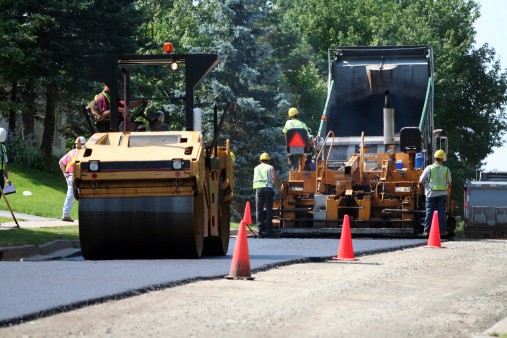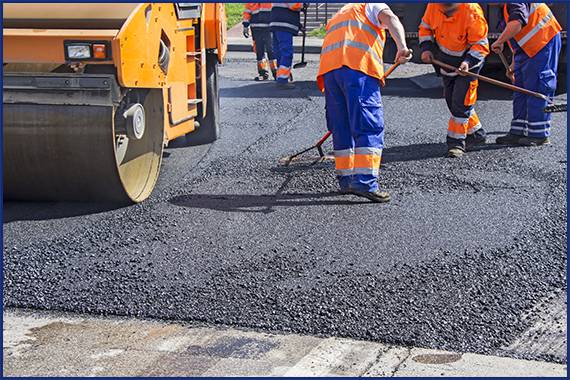Carefully Crafted Surfaces with Our Trusted Paving Service
Carefully Crafted Surfaces with Our Trusted Paving Service
Blog Article
Exploring the Different Kinds of Asphalt Paving and Their Benefits
The landscape of asphalt paving includes a selection of types, each crafted to deal with specific demands and ecological factors to consider. From the robust attributes of Hot Mix Asphalt to the environment-friendly qualities of Recycled Asphalt Sidewalk, comprehending these options can dramatically affect project outcomes. Additionally, advancements such as Warm Mix Asphalt and Porous Asphalt introduce additional layers of performance and sustainability. As we explore these different paving options, the nuanced advantages they supply may surprise you and possibly change your approach to future paving projects.
Hot Mix Asphalt
When thinking about one of the most efficient leading services, warm mix asphalt (HMA) sticks out as a premier option for numerous applications (paving service). HMA is a flexible paving product recognized for its durability, flexibility, and general performance. It is generated by heating asphalt binder and combining it with aggregates at heats, ensuring an uniform mix that can hold up against different environmental conditions
Among the key benefits of HMA is its ability to supply a smooth, skid-resistant surface, improving security for cars and pedestrians alike. In addition, HMA exhibits excellent resistance to contortion, making it perfect for high-traffic areas such as freeways and car park. Its flexibility to different environments better adds to its prevalent usage.
The installment procedure of HMA is relatively quick, allowing for reliable project completion with marginal interruption to website traffic. Moreover, it can be reused, lowering waste and promoting sustainability within the building and construction market. Overall, hot mix asphalt remains a top choice for paving professionals due to its robust performance characteristics and lasting cost-effectiveness, making it a trusted solution for various infrastructure demands
Cozy Mix Asphalt
Warm mix asphalt (WMA) offers an innovative choice to hot mix asphalt, providing similar benefits while requiring reduced production temperature levels. Typically produced at temperatures in between 190 ° F and 250 ° F, WMA innovation reduces energy consumption and greenhouse gas emissions throughout manufacturing, making it a more eco-friendly alternative.
This versatility can lead to enhanced compaction and total sturdiness of the asphalt surface. Furthermore, WMA can be made use of in numerous applications, varying from freeways to property driveways, without endangering performance.

The incorporation of ingredients or customized binders in WMA adds to its enhanced properties, guaranteeing that it meets or goes beyond efficiency standards. WMA's minimized thermal influence during manufacturing can reduce the possibility of damage to the surrounding setting, making it an enticing selection for sustainable paving practices.
Cold Mix Asphalt
Cold mix asphalt is a versatile leading service generally made use of for short-lived repairs and low-traffic locations. This kind of asphalt is created at ambient temperature levels, making it a hassle-free selection for fast repairs and tasks where traditional warm mix asphalt may not be viable. The blend usually consists of asphalt binder, accumulation, and ingredients, enabling it to stay practical for an extensive period.
One of the key benefits of chilly mix asphalt is its simplicity of application. It can be mounted without specialized devices, making it obtainable for smaller service providers and do it yourself fanatics. In addition, cool mix can be used in various weather condition conditions, which is particularly beneficial for immediate repair needs.

It might not supply the very same long-lasting toughness as hot mix asphalt, its fast application and adaptability make it an exceptional selection for short-term services and low-traffic applications. On the whole, chilly mix asphalt continues to be a sensible option in the asphalt paving landscape.
(learn more)
Porous Asphalt
Porous asphalt is a cutting-edge paving option made to improve stormwater management and reduce surface area drainage. This sort of asphalt includes a special structure that integrates interconnected voids, enabling water to penetrate with the surface and into the underlying layers. By promoting all-natural water drainage, porous asphalt assists mitigate the danger of flooding and lessens the concern on metropolitan stormwater systems.
Among the primary benefits of porous asphalt is its capability to improve water high quality. As stormwater infiltrate the pavement, pollutants and debris are entraped, reducing the number of impurities that get in neighborhood waterways. This contributes to healthier ecological communities and sustains compliance with environmental regulations.
In addition, permeable asphalt can boost the long life of the sidewalk itself. By reducing water build-up externally, it minimizes the possibility for freeze-thaw cycles that can cause cracking and damage. The reduced requirement for conventional stormwater administration facilities can result in expense financial savings for municipalities and programmers.
Recycled Asphalt Sidewalk
(start now)Recycled asphalt pavement (RAP) stands for a lasting technique to road building and construction and maintenance that profits both the setting and the economic climate. By reusing existing asphalt materials, RAP reduces the need for new resources, which consequently conserves natural deposits and reduces ecological impact. This technique lowers energy consumption and greenhouse gas discharges connected with the production of new asphalt.
The unification of RAP into brand-new sidewalk combinations can likewise lead to significant cost go to website financial savings. Contractors can leverage recycled materials to lower total job expenditures, making it an economically viable option for communities and exclusive programmers alike. In addition, RAP provides similar performance attributes to virgin asphalt, ensuring sturdiness and longevity in road surfaces.
RAP's convenience permits it to be utilized in numerous applications, consisting of highways, parking area, and property driveways. By improving the structural stability of existing sidewalks, RAP adds to improved security and smoothness of streets.
Conclusion
Finally, the varied kinds of asphalt paving each deal unique advantages tailored to certain requirements. Hot Mix Asphalt masters sturdiness and fast installation for high-traffic locations, while Warm Mix Asphalt improves sustainability via decreased power intake. Cold Mix Asphalt acts as an economical alternative for immediate repairs, Porous Asphalt successfully takes care of stormwater, and Recycled Asphalt Sidewalk promotes environmental duty. Jointly, these leading remedies add to efficient, eco-friendly practices in the building market.
Report this page